Eurovision is more than the world’s biggest Song Contest. While watching it you cannot ignore the colours and the passion of those around the arena. Many come decked out in national flag dress to cheer on their entry year in, year out, and they create an atmosphere akin to any football match, just with many more countries all squeezed in together at once and a far lower history of violence.
The Eurovision Song Contest has a huge army of fans around the world, supporting the Contest, discussing and debating everything around the event. It hasn’t always been like that. Ben Robertson investigates.
The growth of ‘The Loyal Eurovision Fan’ we see now as part of the Contest, correlates with the start of these fans being organised. In 1984 Organisation Générale des Amateurs de l’Eurovision (OGAE) was created in Finland. While I was attending the final of UMK 2014, I decided to investigate this further. I wanted to know, from the home of OGAE, how important this group of fans is for the Contest, how it has grown to where it is today, and how it can continue with successful growth in the future.
Talking to the Top Dog
On the OGAE website, the story of the beginning of the Club is credited to one man, Jaripekka Koikkalainen from Savonlinna, a picturesque part of Finland near the Russian border. As the Fan Club idea spread from nation to nation, eventually a tipping point was reached where international co-operation was needed. An International Co-ordinator, the figurehead for OGAE, was established in 2002, meaning that fan groups could work together with one united front.
This International Co-ordinator now is Maiken Mäemets, also Finnish, and a previous President of OGAE Finland as well.
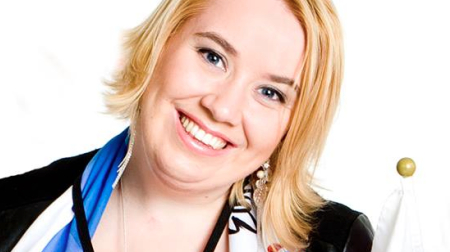
Maiken Maemets
When I interviewed her before the final of UMK, I was blown away by her down-to-earth manner within minutes. When meeting the top dog in the Eurovision fan world, the mind expects an out-going and potentially outspoken character full of charm, drive and charisma. Maiken isn’t like that at all – although still somebody who likes to strive for improvements and wanting the best for the fan movement, she is not the kind of person who demands attention.
Maiken herself understands her role in quite a conservative light. She firmly believes that the President of OGAE International is not and should not be the person taking the limelight all the time. A wise move perhaps, knowing as we all to the strength of emotion and difference of opinion Eurovision gives us constantly. She describes her role as one akin to a secretary:
“So many people come to me to be the face of fans, and I’ve always wanted to avoid that. I don’t make any of the decisions myself for how OGAE International is run; I don’t force anybody to do anything. What we ask is always grounded, and nothing is mandatory. If they [the fan clubs] want tickets, they get tickets, if they want accreditations, they get accreditations.”
That isn’t to mean that a secretary does not have power and responsibility. There are now 40 different clubs in OGAE International, and I wanted to know how hard it was to work with 40 different groups and their leaders all trying to do the best for their members. Is it tough?
“Yes, of course,” Maiken continued, “we can never be in full agreement, each Club has their own interests and members in mind, as it should be. I might be highly educated so I know how to lead people but then there are people who are not. But we have to be fair to each of the 40 clubs with different cultures, different people and different ways of working. We in OGAE International have to do the calculations to make it balanced.”
Getting Everyone A Ticket, And Will They Be Standing?
Of the approximately 10,000 OGAE members, nearly 2,000 of them bought one of the OGAE Fan ticket packages for Malmö to see Eurovision shows every night from the Monday to the Saturday of Eurovision week, and a slightly higher number will attend in Copenhagen. For many fan groups, the politics of these tickets is a source of frustration on a constant level. Internet updates from fans about the lack of information or information changing last minute is commonplace.
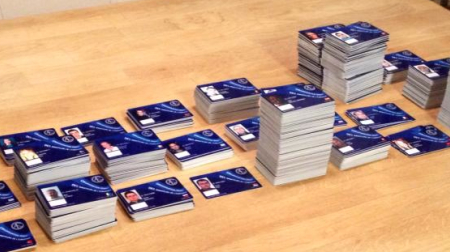
Your membership card is in here
“I’m can tell you everything now; nothing is kept behind a curtain. One person does all the negotiations regarding the tickets, for the last three years I have been in charge of the ticketing negotiations. It is very centralised, before that we had different people send random emails across to different people saying, ‘Hello, can we have some tickets?’
Now the organisers and EBU have an agreement with us so this is done automatically when a new city hosts. There is a condition that X amount of tickets goes to the Fan Clubs. But there are reasons to this, they are not just doing it out of the goodness of their hearts, they want to work with us and develop a working relationship.”
I had to ask about ticketing frustrations came to a head before the 2013 contest, where a standing fan zone was brought in place. What actually took place behind the scenes?:
“We released the information about the standing zones to the clubs before it was allowed, some might say we leaked the information,” Maiken divulged. “We got, as you can imagine, a rush of feedback from fans about this all available. We wanted to be in these discussions with a well-grounded view of what fans wanted. We knew it would be tough, that fans may not take it well, that some may feel betrayed.
“In all honesty, making that decision about the seating was one of the toughest decisions I have ever taken. I did not sleep for a week before I made the call. In the end, the arguments were convincing and I am glad that we are making further improvements to the fan tickets. This year we have got the split of fan sections and the front area being dedicated for those fans. That is great news.
“We must always remember too that the tickets are a benefit, they are not a right. We have to keep showing why OGAE deserves to have this relationship.”
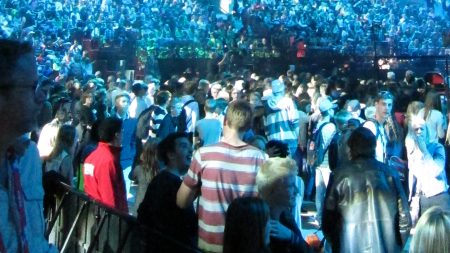
Seating or Standing in Malmo (Picture: Ewan Spence)
There is much that OGAE can do to celebrate. Those tickets are being sold in increasing numbers each year (barring the anomaly of Baku), the numbers of clubs (at a record 40), and the number of members has on average a 3% increase annually across the entire OGAE. A further level of success has to be the return of the Euro Fan Café to Malmö. OGAE Greece started off the separate organisation of fan events first in 2006, but the Euro Fan Café this year took that to a higher level for the whole two weeks of events.
“We realise that our responsibility is to deliver Eurovision for fans, and it is easier that we organise to have a place to go. We can make the activities better, we can make them what fans want and we have the control to do that.” Maiken added, clearly proud of the growth of the fan presence at recent years.
The Launch Of A New TV Show For Finland
The fan image of the Eurovision Song Contest is growing, and, as Ewan has picked out, you can see the success of the National Finals across Twitter over the last few months as a visible presence. But this idea of a growing and more important fan image needs always to be taken with a pinch of salt. Eurovision may have a hardcore fan base that is very active, but that hardcore base is only increasing gradually. The Song Contest still reaches out across a multi-million TV audience, and, with any luck, a longer bridge to success for the music and cultures beyond one night in May. Uuden Musiikin Kilpailu, UMK as we call it, as it so happens is a perfect clash of the two cultures of Eurovision old and new crashing together.
Translating to ‘New Music Competition,’ UMK is a re-launch of how to pick a Eurovision song in Finland. I was lucky to speak to Arttu Nurmi and Anssi Autio. Together they make up the team that created the new concept of UMK two years ago in 2012.
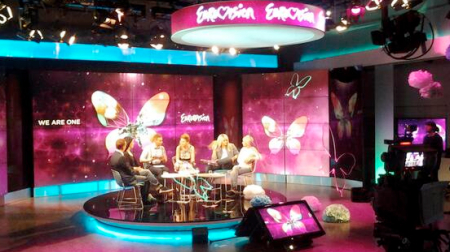
The UMK 2014 Previews studio (Picture Arttu Nurmi / YLE)
“We have two goals,” Anssi began, “One is to select the best possible song and performance for the Eurovision, at the same time though we want to find good new talents and entertainment – not just in TV but in social media. We want to make this a multimedia idea, with the consumer at the centrepoint. So they can feel and touch, come here and participate or be at home and participate.”
When watching UMK, it is clear to see this come through across in the show. Social media is given high prominence (with the #umk14 hashtag always visible in the top corner of the broadcast), and the impact the artists have across that platform is brought up as well. They want interaction with what they are doing to create a full and holistic picture of artist and song.
Arttu continued, “We wanted to put more and more effort into the idea of entertainment. What is entertainment? Today I believe it’s about stories and miracles, we want to show miracles. We want to show the whole road in their journey.”
This new concept though, also had a secondary purpose to diversify the competition. UMK is a different beast in comparison to the schlager-loving Euroviisut.
Making Eurovision Something Better Forever, Not Just For One Night
“We wanted too to get wider genres of music in. It was very narrow; it started to live its own life. The music of Finland was living in a different life. Do we live with this show just in its own little Eurovision bubble, while the other music goes the other way?”
Arttu’s question makes a point again we all know too well about Eurovision – and the musical stereotypes can be seen each and every year in the contest. Maiken herself expressed this as her biggest pet hate; when people tell her, with a strong self-certainty, that Eurovision music is crap. It’s something many of us have heard through time, so, speaking to Arttu and Anssi, I wanted their take on this idea about the stereotypes of Eurovision music.
Anssi thought hard before answering the question, trying to think of a good diplomatic answer. “If you ask me, there is good music in the Eurovision, and it has every type of music. A good song is a good song, but you can write a song that is directed just to the Eurovision Song Contest, and that can be a problem.”
Artti continued on the same vain, “When we believe we say we can change UMK and take more music genres in, we believe that Eurovision, the big brand, is making those same changes. Other countries need to think about their preselections, we believe in the future Eurovision where it becomes a real music and song contest.”
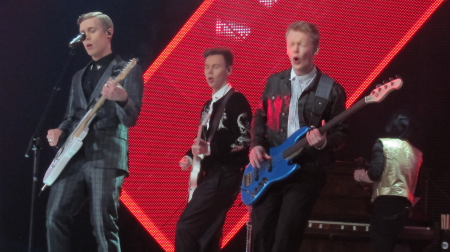
Softengine will learn to open their eyes before May 2014
The power and deepness that both Anssi and Artti were committed to their goal was comforting to know. They really did have a vision about what they want Eurovision to become. There was a depth of emotion pouring out about this from Artti as he kept furthering his point, and it was vividly clear his belief behind the project.
“I would love to be in the situation where the song that won the whole concept was the number one in all the countries, played on the radio, be the summer hit. It makes me sad because I can understand that often in this show we make hits that are up there for just one week. In this business it is an awful story. Nowadays these artists think more about their career. They want so much to have a big audience, but they also want to be true to their own music, they want to believe in what they are doing.
“he Eurovision, to be a big name for one evening that is not what they wish for. Maybe it is like that for some, those who have done everything. It’s like taking a bungee jump, the brave thing you can do after everything else is finished. Is that the right future I don’t believe in that, this is a music concept, and with using Twitter and social media we can be there to follow and create the story to match.”
What The Fans Can Do To Help
So, these two TV Executives, if you haven’t got the message yet, are certain in their belief that Eurovision needs to be a bigger, more inclusive and more holistic process to go up to the next level. It isn’t just about creating ideas for the fan community, but for spreading them to touch a wider group of people as well. So, I ask, how important are the Eurovision fans and fan groups. Do they actually matter in the grand scheme of things?
Anssi continued in a very matter of fact way, “At first, when we started this, we didn’t think they were important, but we now realise they are. When you change something like this, with its traditions, you are taking away some precious, like a favourite toy from a child. Now, half the fans are on our side, and the other half are against, but it is getting bigger each year.
This is true for the international viewers too, they can be very close to the show, and they are still in the same line as the Finnish audience as all the artists are new. Are these just Eurovision fans, or fans of good music? We don’t care, they still have their connections. Fans are the front line, and even if they keep tight to their traditions, they still have those members that open doors, they are the first engaging with the show.”
From meeting these gentlemen I saw people who had their vision – but wanted their vision to be one of inclusion not exclusion. One that evolves with everybody involves, not just those that are really full on and into the show. For that reason, it must be gutting for them to see that ratings are at a 10-year low for UMK this year in the final (just 452,000 viewers on YLE’s second channel).
My conclusion from a Fan Club perspective however, was that if the Clubs are going to be successful in the new era, they need to show and demonstrate to individuals like Artti and Anssi that they are the people who open up the doors and give those first opportunities to these artists and songs, and they show how they can start the trends and campaigns that take it forward. If fans can go out and show the passion and support we have for the Contest and the flurry of excitement we can create, then in return Fan Clubs should get the rewards to be further engaged with the show and with the artists. All sides, artists, fans and TV, would then look to be beneficiaries.
What It Means To The Artists
While manning Terry Vision’s camera around the UMK Green Room, I spotted a little purple certificate in Mikko Pohjola’s hand before Terry pounced. This was his certificate from OGAE Finland, his award from them for the best song of the national selection. It provided me with the opportunity to ask this to an artist, to ask them how important their support is as a group. If, should he get to Eurovision, knowing he has hundreds of Finnish Eurovision fans there to fly flags and cheer him on makes all the difference.
‘The reason for entering UMK was that I wanted to give a face to my music, and I think now that I have achieved that. I haven’t really thought about the fans, it is great that these awards are giving, but today is just about thinking about the final.’
Minutes ago, Mikko had just received a lovely certificate from the Finnish Fan Club, which is a great gesture to do, but Mikko put it quite bluntly that actually it’s small fry compared to the bigger picture of being a successful artist. Perhaps it is simply that he’s in it just for his music, perhaps, thirty minutes before the final; frankly asking about this is the last thing on his mind. Regardless of opinions about music taste and other stereotypes about what Eurovision fans may be, we all hope that it has enough status to be a special part of the event for all.
Sure, we can equally find many happy tales of Eurovision artists embracing the love the contest brings (and Finland’s representative last year Krista Siegfrids is of course one example of this), but we wish these to be the norm, not the exception to the rule where we all go crazy about those artists who do come back and do say those kind things about the experience.
Our success stories as fans though don’t come from the success of the artists, or the music, or which country wins the contest, they come from ourselves as fans as looking after each other and ourselves. We have a fantastic membership which is active despite very few if any of us having the luxury to be Eurovision professionals. The events and community that we create are fabulous.
Learnings From The Seats Of Academic Representation
We have our place, but do we, all together, have a directional purpose? The long-term strategies of OGAE that Maiken lead into through discussions about ticket negotiations, was great, but it still put it all on one person’s plate. Maiken wants to focus more support to that international level of OGAE so that they are able to have membership connected with the higher levels of the organisation in a better way. It sounds fantastic, but I don’t want it to be the case that all the weight is on the shoulders of an isolated, unsupported few at the top of the tree. I want to empower our members to share the love.
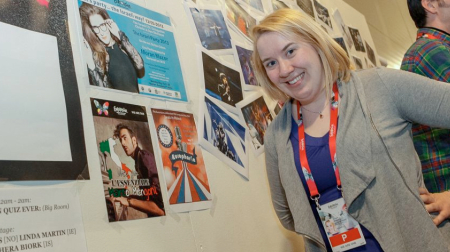
Maiken Maemets (Photo: Dennis Stachel / EBU)
It’s something I know all too well. I was previously a sabbatical officer at Durham University, in charge of clubs, student activities and democracy for the Students’ Union. The similarities and parallels between our Students’ Union and OGAE are staggering. From the size of membership, to the pressure and disengagement of members and the leadership by elected members who are in reality often unproved amateurs. Durham furthermore had the extra disadvantage of being collegiate and trying to co-ordinate 16 separate student bodies as well with different ideas and opinions constantly, just like OGAE.
I believe that some of the tips as to how a run an effective student union are ideas that can be played out to create a more effective OGAE for the future. If we took some of these ideas from the latest National Union of Students publication – The Guide to Quality Students’ Unions – then these could be some of the steps forward to further improve the fan experience, and hopefully increase our engagement and growth.
-
Publication of a strategic plan for OGAE that is presented at their annual meeting voted on and agreed at the annual meeting and then published online, as well as a recommendation to attach to websites of the member clubs. Continue with also including publicly accessible minutes to meetings of OGAE International available online.
-
Major positions on the board of OGAE are selected through a bigger election process that involves all members having their say. Potentially this could include a secure online voting method, or to mandate a club’s President to vote in a certain way.
-
Focus feedback from members to be focused into a set month in the calendar year, rather than sporadic surveys at different times. Feed this information back into the annual report and set up targets to improve based upon this.
-
A clear expectation of the services that OGAE provide at an international level. Create a precedence for activities at key times of the year that OGAE International do and have full/shared responsibility in organising (for example, Euro Fan Café), and create roles for the board members to have varying responsibilities for this.
-
Training packs for different volunteers for OGAE members to be created and used for training. Work with current Presidents on a document to outline the responsibilities that all Presidents need to have with OGAE, which can then be updated for the annual meeting and passed on to any new members. This could be extended to fan café volunteers and press workers as other potential examples.
-
Create a pan-OGAE method of rewarding fantastic volunteer work and through that share great ideas from different OGAE groups through the Annual Meeting process so Presidents take great ideas
I steer clear of the issues of representation and campaigning here, but would like to include it. Maiken confirmed that OGAE International does bring up concerns from fans about rules and ideas about the Eurovision Song Contest, but she could not go into any of those details with me. However, the level of how public these discussions can be is always difficult to assess.
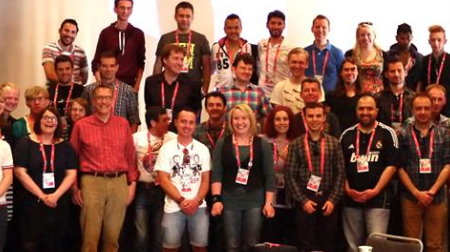
All The President’s Presidents
In conclusion, what I learned most from Finland is that OGAE is a very strong driver for a fantastic Eurovision fan lifestyle, and one that is growing year-on-year. Furthermore, it provides experiences to fans that are not only amazing and fabulous, but also help them make their way in the world.
In the press room at UMK, I was struck by one member of press displaying his ‘We Are One’ T-Shirt while interviewing the acts. After saying hello, I find his name is David, a Eurovision blogger, but was there working for one of the Swedish language publications in Finland. His previous experiences with OGAE, and working as fan press, have resulted directly in his work now at a higher level, and he thanks OGAE for that opportunity without any question.
“The fan club is very important to Eurovision,” David said without any hesitation, “without the fan club Eurovision won’t survive. Most of the journalists get their first breaks through working with the fan clubs. I have been a member quite a long time, today it doesn’t mean as much, I work professionally writing so I don’t need the accreditations and so on. But I support the club and the parties, especially like the Eurovision Cruise is a great occasion.
I think many of the artists in UMK don’t yet realise the power of Eurovision, they are just beginning on the road to Eurovision. I think it surprises them.”
These are the success stories we should look for and encourage. An active membership body of any organisation should be looking to not just look after, but to empower our members to get to where they want to be. We need to be seen to be doing this with more and more examples to further our status of professionalism and a commitment to the cause to gain continuous trust, respect and co-operation with the EBU. Finland is doing so much right in this regard, and the home of the fan movement now has many great systems and structures in place. That fan movement needs to keep up the good work and the development of people across all levels to encourage it to be more and more active in the future as well.
As Maiken said, “it’s not about what OGAE does for you; it should be about what you can do for OGAE.”
My belief is that the focus on the fan movement has to be to encourage and develop members to be more active across all the borders of Europe.








